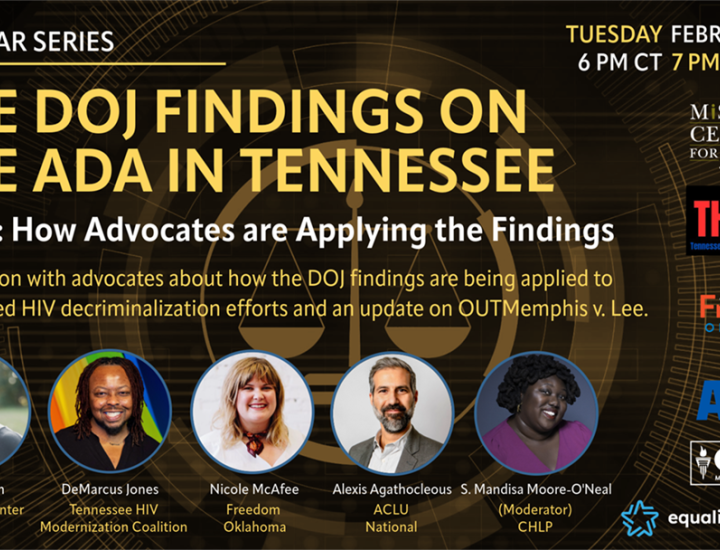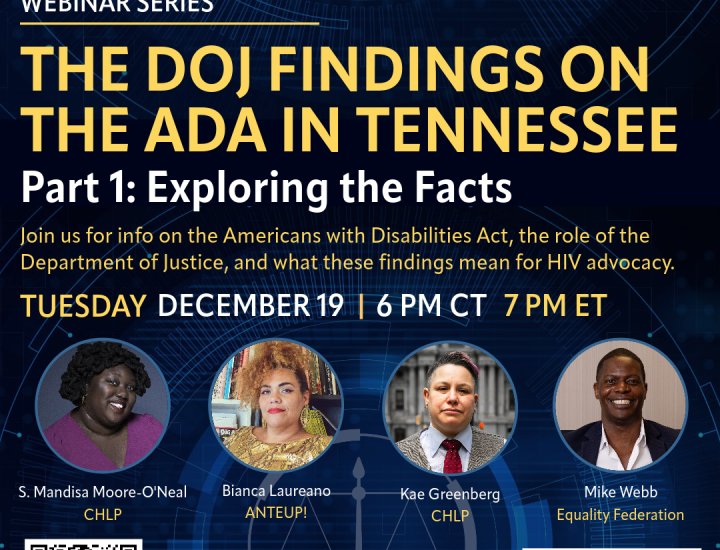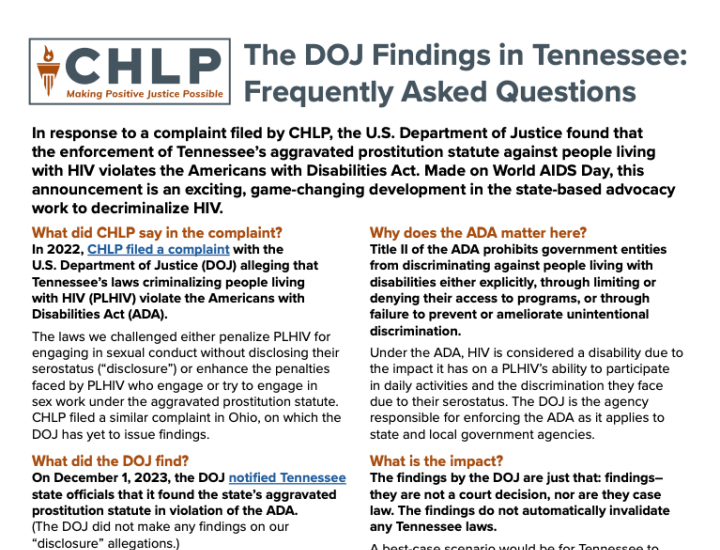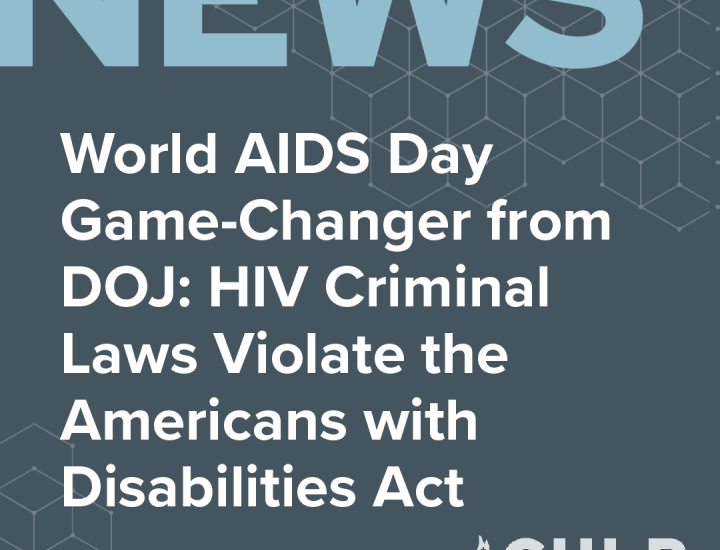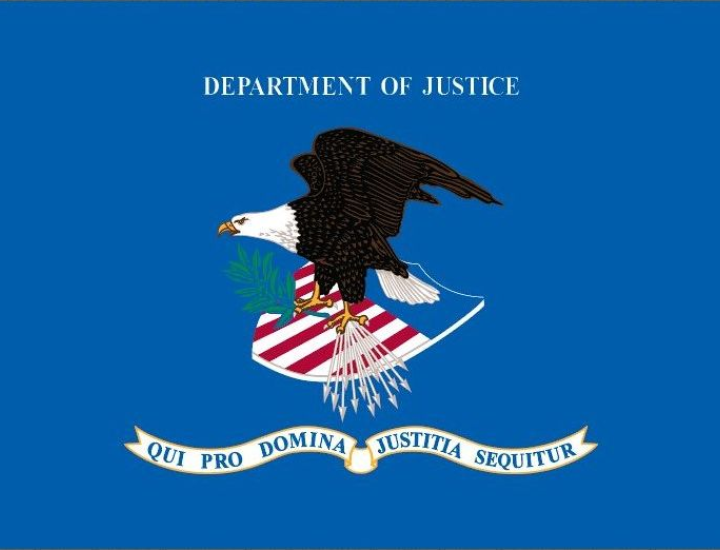The Appeal: Activists Welcome DOJ Crackdown on HIV Criminalization Laws

Adam Rhodes interviewed CHLP Executive Director S. Mandisa Moore-O'Neal and Staff Attorney Kae Greenberg for this article in The Appeal about how the recent DOJ findings in Tennessee not only put other states with similar HIV criminal laws on notice but writ large provide a pathway to use the power of the ADA to fight ableism.
Activists Welcome DOJ Crackdown on HIV Criminalization Laws
Late last year, the U.S. Department of Justice warned the state of Tennessee that its “aggravated prostitution” statute—which makes it a felony to engage in sex work while HIV positive—violates the Americans with Disabilities Act. Activists hope the measure shows how the government can use the ADA to fight ableism around the nation.
Adam M. Rhodes
Jan 31, 2024
On Dec. 1, the U.S. Department of Justice (DOJ) issued a letter to Tennessee officials warning that a state law discriminates against people living with HIV under the Americans with Disabilities Act (ADA). The law in question makes it a felony for people living with the virus to engage in sex work—an act that is ordinarily a misdemeanor in the state.
Now, activists are hopeful the DOJ’s declaration energizes the movement to dismantle said laws around the country—and encourages the DOJ to find novel and more powerful ways to protect people with disabilities.
The letter targeted the state’s aggravated prostitution statute, which, along with a felony conviction, requires people to register as violent sex offenders. Due to that law, people arrested for sex work who are living with HIV face onerous, additional restrictions on where they can live, work, and even exist in public life.
Because the sole basis of the aggravated prostitution statute is a person’s HIV status, the DOJ said in its letter that the law violates the ADA.
“Tennessee’s aggravated prostitution law is outdated, has no basis in science, discourages testing and further marginalizes people living with HIV,” Assistant Attorney General Kristen Clarke of the Justice Department’s Civil Rights Division said in a press release on the day of the announcement, which coincided with World AIDS Day. “People living with HIV should not be treated as violent sex offenders for the rest of their lives solely because of their HIV status.”
The DOJ declined to comment further.
The federal agency issued its letter after multiple groups, including the Center for HIV Law and Policy (CHLP), filed a January 2022 complaint asking the federal agency to investigate what are known as “HIV criminalization laws” in Tennessee and Ohio. Two people living with HIV—a mother in Tennessee and an Ohio resident who said he has lived with fear of being blackmailed or arrested due to his HIV status—also signed onto the complaint.
“Being open about your HIV status is no protection if your partner says they didn’t know,” the Ohioan, Brian C. Jones, wrote at the time. “In fact, it makes you more of a target. I live with the fear of a knock on the door because someone from my past has a grudge or wants to blackmail me.”
According to CHLP, more than half the states in the country have laws that criminalize the exposure of HIV in some way. While a handful of states — Texas, Illinois, and New Jersey — have repealed their HIV criminalization laws, that still leaves more than two dozen with such laws on their books.
HIV criminalization opponents have long argued these laws run afoul of the science of HIV, namely advances in its treatment and prevention. Pre-exposure prophylaxis (or PrEP) drugs reduce the risk of contracting HIV from sex by 99 percent. People living with HIV who adhere to treatment and have an undetectable viral load (referring to the amount of the virus in their blood) cannot transmit the virus.
These laws around the country are also routinely applied in cases where transmission is highly unlikely or impossible—such as biting, spitting, or in cases of oral sex.
In its December letter to the state of Tennessee, the DOJ took particular aim at the Shelby County District Attorney’s Office—namely for its disproportionate enforcement of the state’s aggravated prostitution statute. According to a June 2022 report by the Williams Institute at the UCLA School of Law, 64 percent of all state residents registered as sex offenders based on aggravated prostitution lived in Shelby County.
Shelby County, which includes Memphis, is also the county in Tennessee with the highest Black population, according to the 2020 Census. More than 90 percent of the people arrested under the law in the county were Black. Additionally, roughly three-quarters of those arrested under the law in Shelby County are Black women—facts that experts at CHLP and the Williams Institute said are no coincidence.
“The enforcement of these laws is profoundly racially biased,” said Nathan Cisneros, the HIV Criminalization Project Director at the Williams Institute. “And we see that over and over where we look.”
As part of its findings letter, the DOJ recommended that Tennessee officials stop enforcing the law and make efforts to repair the harm done in the past. The federal agency said the state should remove those impacted from the state’s registry and compensate people for sex offender registry fees and legal costs.
The DOJ’s letter also detailed the case of a Black trans woman, given the alias S.C., who said she struggles to find housing that complies with the draconian sex-offender registry requirements, cannot change her name to match her gender identity, and has faced harassment because the registry discloses her HIV status. She was arrested in 2010.
The DOJ’s letter isn’t a binding legal decision and doesn’t compel the state to stop enforcing the law, other than making a federal lawsuit more likely. However, the document still has massive implications for people living with HIV in Tennessee and around the country.
“It puts states on notice,” S. Mandisa Moore-O’Neal, Executive Director of the Center for HIV Law and Policy, said. “Some states actually have a statute very similar to Tennessee’s, such as Oklahoma.”
Beyond issues of HIV criminalization, CHLP Staff Attorney Kae Greenberg said the letter could also inspire more novel uses of the ADA to challenge systemic ableism in our society overall.
“It can be used, kind of more writ large, to really attack the different ways in which our country essentially shuts disabled people out of access and treats them differently on the basis of their disability,” Greenberg said.
